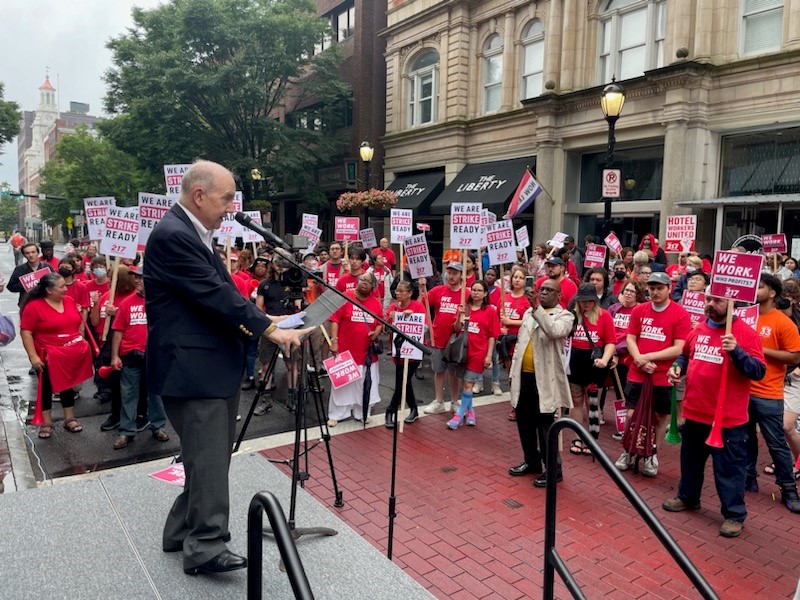Looney, Duff Celebrate One Year of a Safer Connecticut Despite GOP Obstruction
Senate President Martin Looney and Majority Leader Bob Duff marked this week’s one year anniversary of key Connecticut gun safety policies, passed by legislative Democrats despite an overnight filibuster by Senate Republicans.
As of Oct. 1, it will have been one year since the effective date of two critical provisions contained in 2023’s An Act Concerning Gun Violence, which prohibited the open carry of firearms in public and put restrictions on bulk gun purchases, effectively reducing gun trafficking.
These common sense laws have been protecting Connecticut families for one year, despite prolonged efforts by Senate Republicans, who launched an extreme, multi-hour filibuster in an attempt to kill the bill.
Throughout their overnight obstruction tactics, Republicans made 14 separate attempts to water down the gun safety bill. Every single Senate Republican voted in favor of each of these attempts to weaken Connecticut’s public safety laws.
“In an effort to curb gun trafficking and reduce the proliferation of illegal weapons, Connecticut Democrats put modest limits on bulk gun purchases,” Senator Looney said. “Those reasonable restrictions — which still allow residents to purchase as many as 36 handguns in a single year — were apparently too much to ask of Republicans, who unanimously voted 14 times to undermine this legislation.”
“Every two years around this time, Connecticut Republicans characterize themselves as moderates, willing to work on a bipartisan basis, but here’s the reality: last year, they filibustered critical public safety reforms until 4 o’clock in the morning,” Senator Duff said. “Connecticut has the strongest gun laws in the country — and some of the lowest violent crime rates — thanks to Democrats who persevere in spite of extreme Republican obstruction.”
Senate Democrats passed An Act Concerning Gun Violence, HB 6667, at 4:19 a.m. on June 3, 2023, over widespread Republican opposition. Its provisions involving openly displaying a firearm in public and limiting handgun purchases to three per month for most residents took effect several months later on Oct. 1, 2023.
Reasonable limits on bulk purchases have helped to curtail gun trafficking in states where they have been enacted and have helped law enforcement hold offenders accountable.
For instance, on Sept. 3, attorneys general in Maryland and Washington, D.C., filed a lawsuit against three gun dealers for selling 34 pistols to a straw purchaser over a seven-month period despite a Maryland law limiting handgun purchases to one per month.
At least nine of those weapons were later recovered at crime scenes in the Washington D.C. or Maryland area, according to the Office of the Attorney General for the District of Columbia. This is not uncommon. Handguns sold in bulk are as much as 64% more likely to be used in a crime than a gun purchased on its own, according to the Giffords Law Center, which estimated that between 20% and 25% of handguns found at crime scenes were originally part of multi-gun sales.
Meanwhile, Connecticut’s prohibition on the open carry of firearms in public addressed tense situations that have resulted from the state’s previous policies on the matter, which allowed open carry but did not allow law enforcement to compel a person openly carrying a gun to produce a permit.
In 2017, the Connecticut Police Chiefs Association submitted testimony to the legislature’s Judiciary Committee, arguing that a “small number of pistol permit holders have purposely engaged in open-carry behavior and used the current statute language to create situations in which an officer cannot request a permit. These situations are unnerving to the public and have the potential to escalate into confrontations.”
Prosecutors have also lauded Connecticut’s new open carry policy, which legislative Republicans sought to undermine. Last year, Connecticut’s Office of the Chief State’s Attorney submitted testimony supporting the provision to prohibit the knowing open carry of guns in public.
Among Senate Republicans’ 14 attempts to undermine the public safety bill, were amendments to weaken Connecticut’s safe storage laws, assault weapon ban, and the state’s background check requirements. Specifically, Amendment K would have weakened Connecticut’s safe storage laws. It would have permitted gun owners to lock their homes as a means to satisfy the safe storage requirement, regardless if they have children or live with someone ineligible to possess a gun. Previously the law required gun owners to keep their guns in a locked box if a minor was likely to gain access to it, a resident was ineligible to possess guns, a resident was subject to a Risk Protection Order, or a resident posed a risk to himself or others. The bill requires all gun owners to keep the guns in a locked box, regardless if kids might be in the home or an ineligible person lives in the home. So by allowing any gun owner to simply lock the home, instead of requiring a locked box, the amendment would have allowed gun owners, who live with minors or those ineligible to possess guns, to simply lock their doors—with the minors and ineligible people in the house having access to the guns.
Additionally, Amendment M would have weakened background checks and the ban on assault weapons. Whereas the underlying bill expanded Connecticut’s ban on assault weapons, this amendment would have allowed people to transfer such guns to their “family who is not prohibited from owning a firearm.” The bill allowed the transfer of soon-to-be illegal assault weapons to gun dealers and other licensed establishments that adhere to strict background checks and could sell out-of-state, but the bill did not permit the transfer to family members out-of-state. The amendment would eliminate the background check—people do not know, nor should they try, to determine whether their family members are eligible to obtain a firearm under other state laws or any law. State agencies coordinating with federal authorities conduct comprehensive checks, and it is one of the most effective ways to keep guns out of the hands of people likely to harm others with firearms.
FOR IMMEDIATE RELEASE
Contact: Kevin Coughlin | 203-710-0193 | kevin.coughlin@cga.ct.gov









